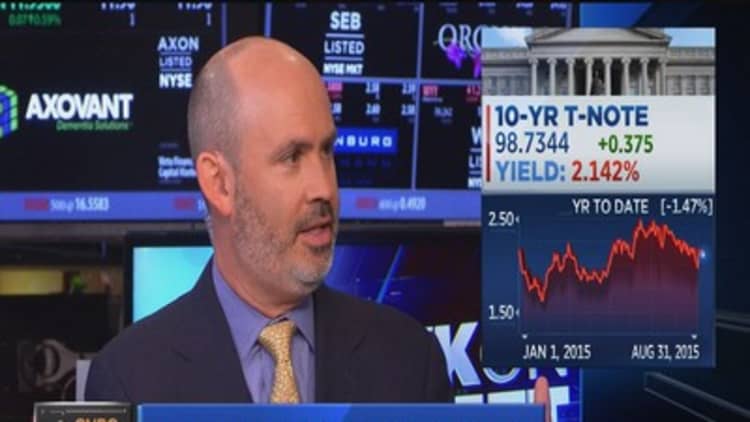When it comes to whether investors should put their money in passively managed funds or those that are actively managed, financial advisors voice a range of opinions.
But if even the pros can't reach a consensus, how is the average investor supposed to decide which is best?
"I'm of the opinion that the debate of active vs. passive management is an overanalyzed perspective [of investing]," said Kevin Meehan, a certified financial planner and regional president of Wealth Enhancement Group. "The most important thing for investor success is finding a strategy — regardless of whether it's active or passive or a combination of the two — that will make a person stay invested through different market cycles."
To nail down a strategy that works for you, begin by making sure you fully grasp the differences between the two investing approaches.
In simple terms, actively managed funds are those with professional stock pickers at the helm. This kind of fund strives to beat its benchmark — an index — by relying on sophisticated research and human judgment calls to determine which stocks the fund should buy and sell.
(In the investing world, an index is basically a list or grouping of securities — whether stocks, bonds or other investments — that represents a segment of the investing universe. How an index fares is based on the performance of the securities included in it.)
The opposite is passively managed funds, which generally are index funds or exchange-traded funds. Because they mirror a market index, there's no need for a manager to handpick individual holdings.
For example, the Vanguard 500 Index fund is invested in the same stocks and at the same weighting as those listed on the , which includes 500 of the largest U.S. publicly traded companies from a variety of industries. The Schwab Small Cap Index Fund tracks the Russell 2000 Index, which measures the performance of the 2,000 smallest U.S. stocks.
One of the biggest differences between the two approaches is that your investment in a passively managed fund means your returns will match the performance of the index being tracked, for better or worse.
Investing in a passive investment "assures you will get the market performance, but it also assures you will never outperform the market," Meehan said. "And that's both a pro and a con."

On the pro side, cost is a major consideration.
The average expense ratio — the annual fee charged to shareholders for simply being in the fund — is generally lower in passive funds than active funds.
While all fund expenses have been coming down over time, passively managed funds remain cheaper overall. Data from research firm Morningstar show that among index funds and ETFs, the average expense ratio stands at 0.69 percent. That compares with 1.21 percent for actively managed funds.
So, plain and simple, gain or loss, passively managed funds deliver — at a lower cost — the returns of whatever index the fund tracks. For the Vanguard fund mentioned above, the index it tracks returned 0.96 percent through Nov. 9 this year. The Schwab fund is mirroring an index that has lost 0.60 percent through the same time.
On the other hand, an actively managed fund might use one of those indexes or another as a benchmark but handpick their stocks and the degree of their exposure to any given stock. While this strategy can come with a higher expense, that personal touch can theoretically mean a fund manager can beat the index and deliver better returns to investors.
However, Morningstar data show that this year, through Oct. 31, roughly 58.6 percent of actively managed funds have failed to beat their benchmarks. And over the last 10 years, 73 percent of actively managed funds have fallen short.
Advisors point out, however, that when the stock market is doing well, it's more unlikely for an actively managed fund to outperform its benchmark. In more uncertain times, actively managed funds can do better.
"We've seen some actively managed funds really add value to a portfolio, especially in times of volatility and when market sentiment is against [a certain market segment]," said certified financial planner Avani Ramnani.
Most people don't have time to research active managers who beat the market. People who are not being ... guided will be much better off with passively managed investments.Harold Evenskychairman of Evensky & Katz/Foldes Financial
"But not all funds or fund managers are created equal," said Ramnani, director of financial planning and wealth management for Francis Financial. "It's difficult to [accurately] pick successful active managers, because you have to do a lot of research."
She said emerging markets and bond markets are two areas where having an active manager handpicking a fund's holdings can have a positive impact on an investor's portfolio.
Another difference between active and passive funds is transparency.
With passively managed funds, "you have total clarity about what you own at any one time," said Meehan of Wealth Enhancement Group. "With an active strategy, you don't know [day-to-day] what your managers are invested in."
That's because a quick look at an index can reveal exactly what your index fund is invested in. You typically can also find an ETF's holdings by looking at the issuer's website.
On the other hand, actively managed funds are required to only report their holdings quarterly (although regulatory efforts are afoot to require such disclosures on a monthly basis).
Another difference involves taxes. Generally speaking, actively managed funds are less tax-efficient because they are, well, more active. That is, they buy and sell their holdings more often. And any capital gains realized by the fund from selling holdings gets passed on to its shareholders.
With index funds and ETFs, which are based on indexes whose components are less likely to change often, capital gains are minimized.
Emerging in the passive-active debate is what Morningstar calls strategic beta and others call smart beta, or enhanced indexing: funds that blend passive index investing with a human's input.
Regardless of what you call them, these funds take a passive approach by tracking an index but modify the weightings of the individual stocks to suit the fund's goal of, say, beating the market or reducing volatility in the fund.
"These are hybrids that sit in the middle," Meehan said. "They can be significantly less expensive than active management but more expensive than a straight passive [fund.]"
Like many advisors, certified financial planner Harold Evensky uses a mix of passive and active investments for clients. Exactly how and when depends on the individual circumstances of each client.
But Evensky, chairman of Evensky & Katz/Foldes Financial, thinks that for investors who aren't consulting with an advisor, passively managed funds are the way to go.
"Most people don't have time to research active managers who beat the market," Evensky said. "People who are not being [professionally] guided will be much better off with passively managed investments."
— By Sarah O'Brien, special to CNBC.com








